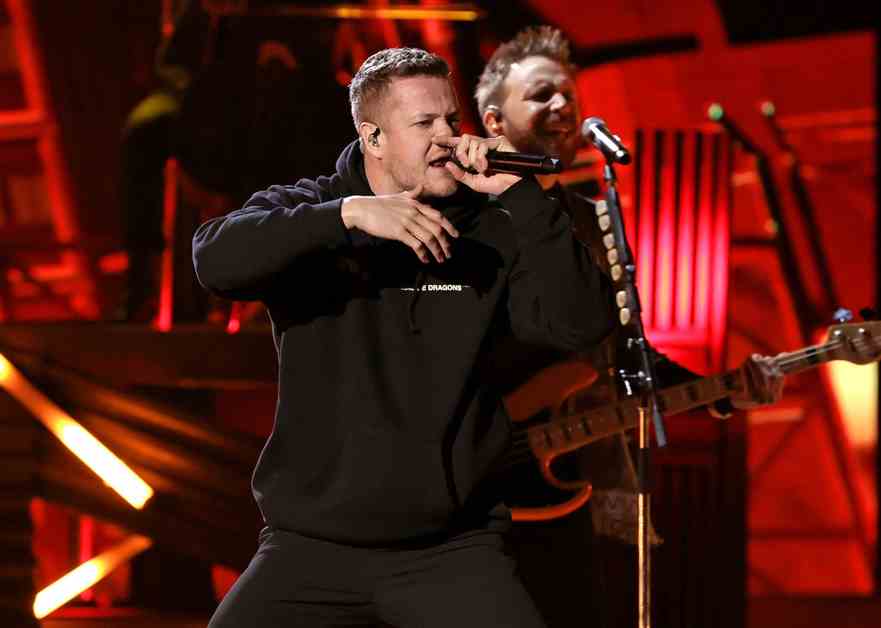How Imagine Dragons Became the Sound of Gaming Culture
A decade ago, former games journalist Geoff Keighley was busy planning the first Game Awards, a project to build some prestige and pomp around video game award ceremonies. He had already booked famed Nintendo composer Koji Kondo to perform on piano a medley of songs from the Legend of Zelda franchise, but he wanted a little more sound to fill the Las Vegas stage. And then he remembered: A young band called Imagine Dragons was climbing charts and fresh off a memorable Grammys performance with Kendrick Lamar. The Las Vegas group would become Kondo’s backing band.
Imagine Dragons has been all over gaming culture ever since. Of all the band’s accomplishments — filling stadiums and arenas, even performing Beatles songs in front of Paul McCartney and Ringo Starr — playing with Kondo remains a highlight, says the band’s frontman Dan Reynolds. He didn’t grow up listening to the Beatles, he grew up listening to the “Athletic Theme” from “Super Mario World.”
Reynolds says the band’s ties to gaming trace all the way back to when publisher Ubisoft asked to use its song “Radioactive” on trailers for the 2012 game “Assassin’s Creed III.” Reynolds loved the series and gave the green light right away.
Since then, various game companies have kept approaching the band. Epic Games’ iOS game “Infinity Blade III” featured the band’s name and song “Monster” (a collaboration that first caught Keighley’s attention, leading to the Game Awards show). In 2017, Nintendo created a Super Bowl trailer to launch the Switch console with the band’s hit single “Believer.” Riot Games and Netflix commissioned the band to write “Enemy,” the theme song for the hit animated series “Arcane,” now approaching 1.5 billion streams on Spotify.
Last year, the band released “Children of the Sky,” a collaboration with composer Inon Zur for the launch of “Starfield,” a marquee Xbox game that lets players explore about a thousand planets. Again, it happened because someone from Bethesda Game Studios emailed the band’s manager about a collaboration.
Imagine Dragons returned to the Game Awards stage in 2021 to perform “Enemy” and a medley of songs from indie studio Supergiant Games. Reynolds says it’s been amazing to see the event eclipse the viewing audiences of other awards shows including the Oscars.
Now the band is about to release its sixth studio album, “Loom,” on June 28. It features more of the band’s signature sound: danceable anthems drenched in reverb and soaring choruses. The latest single, “Nice to Meet You,” is a fun, funk-inflected dance track about Reynolds’s experience with a partner’s friends getting involved in their dating life.
Many Imagine Dragons lyrics revolve around Reynolds’s struggle with depression. Hype classics like “Thunder” are about Reynolds gassing himself up despite overwhelming self-doubt. He admits that “Eyes Closed,” the first single this year (the chorus: “I could do this with my eyes closed”) is empty boasting and bluster that hint at inadequacies he still feels.
Criticism of the band tends to focus on the tension between its marketability and its supposed place in rock music. The Imagine Dragons sound is radio-friendly, approachable and clean, perfect for marketing material. And Reynolds’s choruses are so catchy and concise, you could easily imagine them backing an Apple product launch. iPhone 16 Plus Max? Nice to meet you.
At the same time, Imagine Dragons is one of the few remaining mega acts filling arenas with a real-life electric guitar loud and visible onstage. Critics of the band jeered when the group topped Billboard’s rock charts. Reynolds, for what it’s worth, agrees with them. He owns being a pop act.
“I really think the sentiment of Imagine Dragons ‘keeping rock alive’ is kind of a silly sentiment,” he says. “When I think of rock, I think Nirvana, Foo Fighters, Queens of the Stone Age. I think of a very specific genre that I love, but that’s not what Imagine Dragons has ever wanted to be or tried to be, and it’s not our influences. I didn’t really listen to any classic rock growing up!”
Of course he hears the criticism, but Reynolds says he and the group are happy with their signature sound. They write all their songs based on personal experiences, he says. He focuses on pop hooks, citing classical composers like Chopin and Bach, whom he describes as “very pop.”
“I can genuinely say we’ve never created a record where we’re saying, ‘What do you want, critics? What do you want to hear right now?’” Reynolds says. “I just write songs I want to play. If I’m going to perform them for the next two years, I’d better like them. We’re trying to make sounds that feel good on the ears and make you feel something. And all I’m doing is writing about what’s going in my life. And this happens to be a happy time period.”
And many times, that will mean writing music for the hobby and entertainment medium he’s loved since he was a kid.
“My MO from the very beginning is just following the kid in me. What would little Dan Reynolds love to be a part of?”


